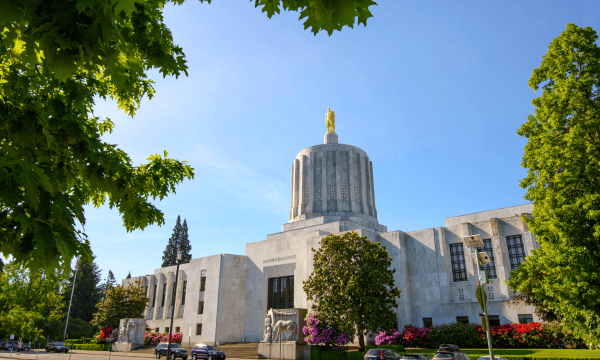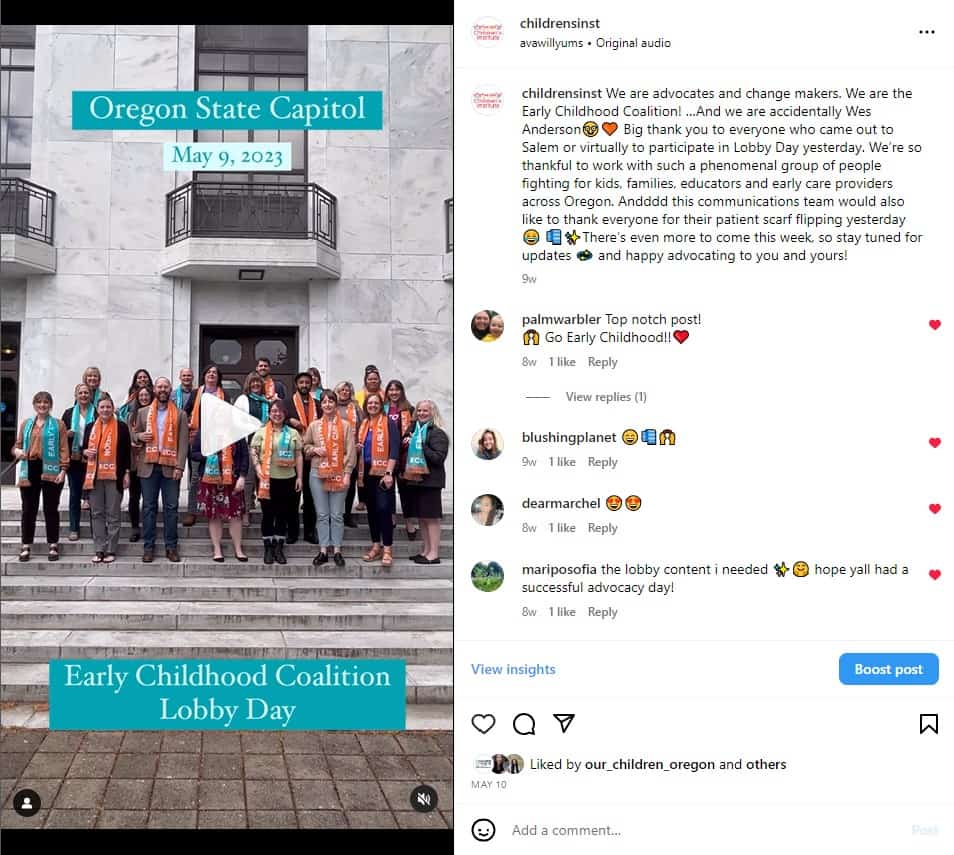Oregon’s Legislature officially adjourned on June 25, 2023, after what was unquestionably one of the most unusual and politically divisive legislative sessions in Oregon’s history. The unpredictable tenor among lawmakers resulted in a mixed bag of outcomes for early childhood policies, and with that, a series of promising wins and some disheartening losses for Oregon’s early learning and care system.
What influenced this year’s legislative session?
- Turnover and change in elected leadership and legislators. Not only did Oregon see a new Governor take office, but the legislature also has a new Speaker of the House, Senate President, majority and minority leaders, and a new House Ways and Means co-chair. In addition to this, about a third of Oregon legislators were new to the Legislature this year.
- The longest walkout in Oregon legislative history. Ten Senate republicans and one independent legislator did not participate in Senate floor sessions for a record-breaking 6 weeks. This brought bills and budgets to a standstill, and delayed the required work of the legislature, causing strain for legislative leadership to figure out how to complete the required legislative work by the constitutional end (Sine Die) of session.
- An unexpected $2 billion increase in the May revenue forecast. Although this mainly stemmed from changes to how the state budget was calculated, it required agencies to rethink their budgets, which posed a challenge to advocates who had already given significant input into a budget that they expected to be much smaller.
- Specific to early childhood, Oregon launched a new agency, the Department of Early Learning and Care (DELC). This is an exciting step for Oregon! However, because DELC is a new state agency, legislators may have been more cautious to give the department additional work or significant funding right away. Of course, advocates and providers shared a goal for a successful DELC launch and saw more opportunity for effective investment and nuance between funding streams than did legislative leaders.
Persistent advocacy, promising wins
Despite many unexpected hurdles throughout the legislative session, strong advocacy from Early Childhood Coalition (ECC) partners and other dedicated early childhood advocates made a significant impact on policy outcomes.
During the legislative session, advocates actively engaged by testifying at public hearings, meeting legislators, making calls, and sending messages to urge state leaders to invest in critical early childhood programs. The Early Childhood Equity Fund, child care facilities, early literacy, and higher wages for child care workers were among the priorities.
“What is clear is that the voices of advocates from all across Oregon absolutely had an impact on the outcomes,” said Dana Hepper, director of policy and advocacy at Children’s Institute. “Early childhood advocates showed up, spoke out, and provided a powerful voice on behalf of Oregon’s youngest children and their families.”
The list below includes the ECC’s priority bills and state agency policy option packages (POPs) that passed this session. For a detailed list of all early childhood policy outcomes, see the 2023 legislative recap.
- HB 3005: Create a child care infrastructure fund (this bill passed and was partially funded)
- HB 2727: Review zoning, building code, and permitting impact on child care
- SB 599: Protect child care providers in rental homes
- HB 2991: Create clear and equitable workforce pathways
- HB 3198: Improve early literacy instruction in preschool through third grade (in 2023) and birth to five (in 2024); fund community-based literacy interventions
- Oregon Health Authority (OHA) POP 425: Universally offered home visits (family connects)
- OHA POP 414: Implement early periodic screening, detection, and treatment (EPSDT
Missed opportunities
During the thick of the governor’s race and in the months leading up to the 2023 legislative session, early childhood partners called on incoming state leaders to commit to a bold vision of leadership for Oregon children.
And in a May 2023 letter to the Legislature’s Ways & Means Committee, Children’s Institute’s CEO Kali Thorne Ladd, urged legislators to prioritize investments in early learning and care.
“Investments in early childhood are among the most important investments we can make,” Thorne Ladd wrote. “While Oregon has made progress in this area, we must continue to invest in and strengthen the opportunities we create for children and families across the state.”
Unfortunately, the Oregon Legislature missed a few needed and critical opportunities to invest in young children in this session:
- Early Intervention/Early Childhood Special Education (EIECSE). Funding for this program was cut by $19 million, which will result in cuts to services for babies and preschool aged children with disabilities and developmental delays. It will also likely result in workforce layoffs, in a time where there is already a shortage of early childhood workers. Early childhood advocates remain optimistic and continue to work with the Governor and legislative leadership to find a pathway to prevent cuts to these essential services.
- Employment Related Day Care (ERDC). In the last bill of the legislative session, the State allocated funding to the Department of Early Learning and Care (DELC) to help raise rates for child care providers and to support an increased number of families participating in the program. Even so, DELC estimates that this is not adequate and will result in reducing the number of working families that can be served. Advocates also continue to work with the Governor, DELC leadership, and legislators on this to prevent the need for a waitlist for child care subsidy.
- Early Childhood Equity Fund and Kindergarten Partnership Innovation Fund. CI worked hard to ensure that birth to five was included in the early literacy package (HB 3198), but these programs will have to wait a year to receive any funding for early literacy efforts. Birth to five literacy dollars should be used to make needed investments in the Early Childhood Equity Fund, which would support activities to help young children practice school readiness skills and provide culturally specific and language specific programming, as well as the Kindergarten Partnership Innovation Fund. While we are glad Oregon recognized the importance of the first five years in early literacy, we are disappointed the funding is delayed by a year.
Next steps
Although the session has concluded, our work is not done. There are a few key next steps to ensure continued success for our policy wins.
Moving forward, it is essential to ensure the successful implementation of the early childhood policies that passed, with continued engagement from community-based organizations and early childhood advocates. Ongoing engagement, appreciation, and accountability for session outcomes are crucial, as we work to build support among legislators for early childhood issues. CI will be intricately involved with efforts to support implementation.
Looking ahead, we must plan for the future and drive momentum to secure additional funding in the upcoming legislative sessions and through the Emergency Board, continuing to push for needed programs such as the Early Childhood Equity Fund, Early Intervention/Early Childhood Special Education, and Employment Related Daycare.
Together, as dedicated advocates for early childhood issues, we will persist in our efforts to continue to drive policies that help make Oregon the best place to be a kid.


